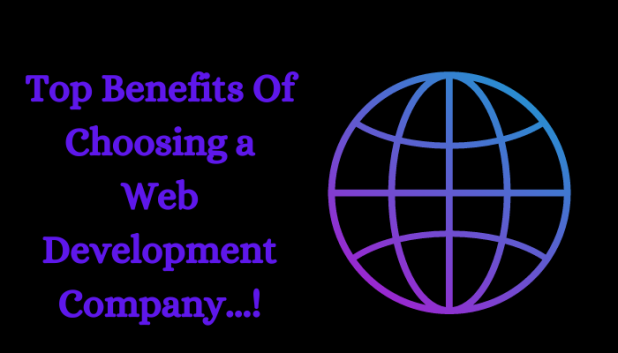A web development company offers a plethora of benefits to businesses and individuals looking to establish or enhance their online presence.
Here are some of the top advantages of a web development company:

Professionalism
One of the primary benefits of hiring a web development company is the assurance of professionalism. These companies typically consist of teams of skilled developers, designers, project managers, and quality assurance specialists who bring their expertise to the table. They understand the latest trends, technologies, and best practices in web development, ensuring that your website is built to industry standards.
Customization
Every business has unique requirements and goals for their website. A web development company can tailor the website to meet these specific needs. Whether it’s integrating custom features, designing a user-friendly interface, or optimizing for search engines, a professional web development team can create a solution that aligns perfectly with your objectives.
Quality Assurance
Building a website involves more than just coding. It requires thorough testing to ensure that the site functions seamlessly across different devices, browsers, and screen sizes. A web development company follows rigorous testing procedures to identify and fix any bugs or issues before the site goes live. This attention to detail helps deliver a high-quality end product that enhances user experience and minimizes technical glitches.
Scalability:
As your business grows, so should your website. A reputable web development company can build a scalable solution that can accommodate your evolving needs. Whether you need to add new features, expand your online store, or handle increased traffic, they can implement solutions that allow your website to scale without compromising performance or user experience.
Time and Cost Efficiency
While it may seem initially more expensive to hire a professional web development company, it can actually save you time and money in the long run. These companies have streamlined processes and access to advanced tools and technologies that enable them to work more efficiently. Additionally, they can help you avoid costly mistakes that may arise from DIY or amateur web development efforts.
Technical Support and Maintenance
Launching a website is just the beginning. It requires ongoing maintenance, updates, and technical support to ensure optimal performance and security. A web development company provides continuous support to address any issues that may arise and keep your website running smoothly. This frees you up to focus on your core business activities without worrying about the technical aspects of website management.
SEO Optimization
A professionally developed website is more likely to rank higher in search engine results, driving organic traffic to your site. Web development companies have expertise in implementing SEO best practices, such as optimizing site speed, improving site structure, and creating relevant content, to enhance your website’s visibility and reach online.
Competitive Edge
In today’s digital age, having a professionally designed and developed website is essential for staying competitive. A well-crafted website not only attracts more visitors but also enhances your brand image and credibility. By investing in professional web development services, you can differentiate yourself from competitors and stand out in the crowded online marketplace.
Conclusion
Partnering with a web development company offers numerous benefits, including professionalism, customization, quality assurance, scalability, efficiency, technical support, SEO optimization, and a competitive edge. Whether you’re a small business, a startup, or a large corporation, investing in professional web development services can yield significant returns and contribute to your online success.












